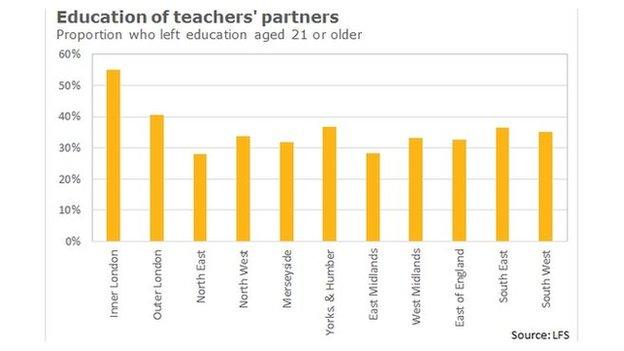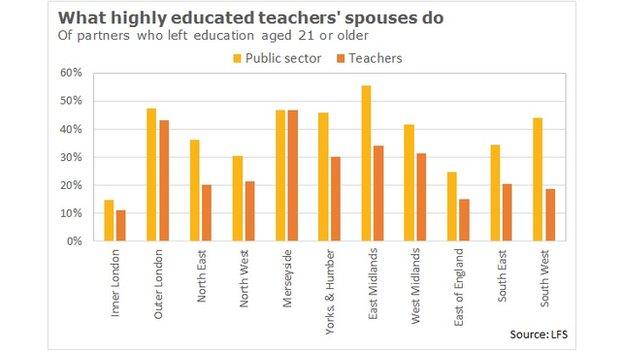Is Cupid's arrow at the heart of London schools' success?
- Published

One of the persistent questions in English education is a big one: why do London schools do so spectacularly well?
Children living in the city's poorest neighbourhoods can now expect a higher average GCSE grade than the average child outside London. London simply operates in a different league., external
There is no one silver bullet. The capital had interventions, such as the London Challenge, reformist local authorities and, in some areas, the "sponsor academies" programme.
But it also has some uncopiable features. One of them is access to a particularly huge pool of talented teachers.
Perhaps this is a reason why: one little-discussed feature of modern life is so-called assortative mating - university graduates now tend to pair off with other graduates (and non-graduates with non-graduates).
It is an effect of the rise in participation in higher education over recent decades.
London's advantage
So teachers are now more likely to marry graduates. And, when they are looking for work, they need to consider where their partner or spouse will work.
That gives London a big advantage over other cities: it holds a disproportionate share of the labour market for ambitious graduates.
Others have suggested this before,, external so I thought I'd have a go at testing the theory.

If it were true, and plausibly relevant, we would expect a large differential between London and the rest of the country when it comes to the number of teachers married to graduates. That, indeed, is what we do find.
For reference: in the Annual Population Survey, we can find a few thousand teachers - and their spouses.
For simplicity's sake, I have classed people who left full-time education after the age of 20 as "graduates".
"Partners" are either married to them or cohabiting with them as a couple.
You can see that inner London, in particular, is very different to the rest of the country.
And that is where all the action is on school improvement. Perhaps, despite being paid badly relative to the local cost of living, London teachers will stick it out in the city for romance.
That tallies with what a lot of school leaders report: it is difficult to recruit some specialties in the urban north, in particular.
'Market-facing pay'
They also say it is a particular problem linked to younger teachers. That, too is borne out by the data.
The samples get too small for comfort, but they do imply the differential in partner education between London and the rest is higher among younger teachers.
I also had a look at what these highly educated partners actually do.
It is striking that teachers paired off with graduates are quite likely, in some parts of the country, to be other teachers.
And the public sector, more broadly, is also a very big employer of them outside London.

You can see, in London, much greater variation in what educated partners do. Again, it does not prove it, but it is certainly consistent with the notion of the "trapped teacher". So why does all of this matter?
Well, first, the Department for Education has flirted with the idea of "market-facing pay", external.
That would mean paying more to London teachers (where schools are good) and less for much of the urban north (where they are weaker).
If London teachers are in the city for love, and not for money, the argument for paying them more weakens.
Second, one of the big questions in education is "how do you spread London's success to other places"?
Spread jobs out?
Well, there are three obvious solutions.
First, you can try to match them up with people whose careers won't take them to London. Second, you can force (or incentivise) teachers to work in areas outside the capital.
Or, failing that, you could try to spread graduate jobs out from the capital.
Romance makes it hard to run good public services in areas where the private sector offers few job opportunities.